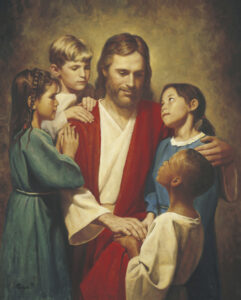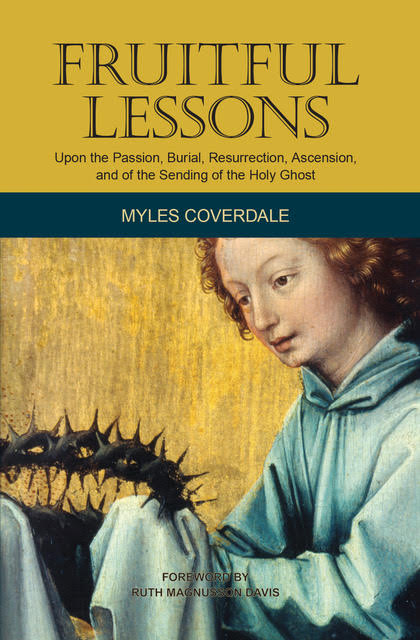I wrote elsewhere about the Santa Claus lie in 2012, after hearing non-stop songs of praise, and even love, to Santa on secular adult radio during Christmas. Now this year I’ve noticed them again: “Santa baby, hurry down the chimney tonight!” “It’s the most wonderful time of the year, ho ho ho!”
In many respects now, Santa really is a counterfeit Jesus at Christmas. For example, besides songs of praise to him, people now (at least, where I live) rarely decorate their homes with nativity scenes, but with Santa scenes. I heard someone say that this is the “Santa Season.” I heard a personal testimony about a woman who, in her suffering, is comforted by thoughts of Santa. So sad, to think of such “tidings of comfort”! Then again, a man said he was looking forward to watching his favourite old Christmas story on film: “Santa Claus Conquers the Martians.” Never mind that Christ conquered the devil! I have heard talk about the miracle of Santa, and never mind the miracle of the Incarnation of the Son of God. Then there is the intense focus of the promise of Santa to come: “Santa Claus is coming to town!” This mimics, and, as far as the world is concerned has quite replaced, the traditional Christmas focus on Christ who is to come.
The Christmas Advent season in the Church’s liturgical calendar is not only a time to remember Christ’s birth and first coming, or his first advent. It is also a time of preparation for his second or next advent, which will be as Judge at the Last Day. But in the popular consciousness, the preparation for Santa’s next advent counterfeits and has displaced all thought of Christ. From a popular Santa song:
Who comes around on a special night? Santa comes around on a special night … Who very soon will come our way? Santa very soon will come our way … Must be Santa, Must be Santa, Must be Santa, Santa Claus. (From the song Must be Santa)
Perhaps we should rename the season “Santamas”! As far as the world is concerned now, Santa is the reason for the season.

Santa comes in the sky with a shout, Ho Ho Ho!
The promise of Santa’s advent is a lie simply because no one named Santa exists or is coming. I realize that some people will say that the Santa story is only a fun and harmless fairy tale. However, Santa is not usually presented to children as a fairy tale figure, but rather as someone real, someone in whom they should believe. But, people will say, believing in Santa motivates children to be good. Consider the following well-known lyrics:
You better watch out, you better not cry, I’m telling you why … He’s making a list, he’s checking it twice … He’s gonna find out who’s naughty or nice … He sees you when you’re sleeping, he knows when you’re awake … He knows when you’ve been bad or good, so be good for goodness sake! (From the song Santa Claus is Coming to Town)
But the gospel of Jesus, and believing on him, was meant to teach children to be good. Here it has been replaced by the gospel of Santa – and this in the very season set aside to remember Christ. This song also reveals another way that Santa counterfeits the Lord: both are all-seeing, and both know when you’ve been good or bad.
The fact that the gospel of Santa is given in the season named for Christ makes it pernicious: the jolly fat man has usurped Christ in popular lore and in nighttime children’s stories. Is Santa’s eagerly awaited advent from the North Pole really just a harmless story to teach children at Christmas? From a Santa preacher:
Santa Claus songs – some are very familiar! Have fun with them. Teach them to your children! The lyrics are right here for you! Sing a song of Christmas fun! Santa always makes me smile! Ho!Ho!Ho! Laugh a little and sing a lot! Your children will treasure the memories of singing with you. Sing as if nobody’s listening! Sing for the pure joy of singing! Have fun! (From the website squidoo.com/santa-songs, 2012)
Should we set children’s little hearts a-blaze with the joyful hope of Santa’s coming? But by this means, an infinitely worthy hope has been exchanged for a “fun” but vain one.
The Santa Claus lie has consequences
I remember how betrayed I felt on the day when, as a child, a boy at school told me that there was no such person as Santa. He mocked me for believing the Santa Claus lie. It rocked me: What! My parents had lied to me? When, as they had taught me to do, I wrote down my prayers for good things in a letter to Santa, burned it in the fireplace, and watched it go up the chimney to the North Pole in drafts of smoke, I was deceived? When I lay in bed on Christmas Eve listening for hoof beats on the roof, I was waiting for something that never could or would happen? When my sister and I watched the sky for the lights of a passing sleigh, we were living a lie?

Children write letters to Santa and send them up the chimney to the North Pole in drafts of smoke (as they believe).
It was a bad shock to me. I had always trusted that my parents told me the truth, but my trust was shaken. When I got home from school that day, I looked around, and in the back of a closet found evidences of the lie: the usual Santa goodies stuffed in a box. Just to be sure (what should I believe?), on Christmas Eve, when Santa was supposed to come, I kept myself awake, and saw my father creep into the room and put a stocking on the end of my bed. I can still see it in my mind’s eye: at the same I both loved him and mourned the lie. (I still love him and mourn the lie when I remember it now.) I wondered if I should tell my younger siblings the truth, but if I did this, was I betraying Mum and Dad? I also wondered about telling my parents that I knew their secret. I did not want to participate in the lie by pretending that I still believed in Santa.
The plain fact is, there is no Santa Claus, and if you preach Santa to your children, you are lying to them. I hope no Christian parent does this. We are not to love and make lies (Revelation 21:27, 22:15). As Augustine said, we are not given a tongue and the gift of speech to fabricate falsehoods. At the very least, if they do not avoid the fiction entirely, parents should be upfront about the fact that there is no real Santa Claus. My parent did not do this; they erred. I forgive them. I know they did it of love. But still, the lie hurt me.
Lies have consequences, especially for an earnest and truthful child. But for all children, lying to them teaches them that lies are okay — and worse yet, to love lies. Further, this lie destroys the real meaning of Christmas and snuffs out the gospel of the Son of God.
The s-a-t-a-n anagram
And what about the eerie santa/satan anagram? Anagrams, or letters inverted to make new words, are said to be employed under Satanic influence. (Karl Marx made Oulanem out of Emmanuel.) The name Satan, with the inversion of a few letters, is easily altered to Santa.
How much should we make of this? I don’t know. I have not taken time to research it, except to check the Oxford English Dictionary (OED). The OED says only that the word “Santa” arose in the USA in the 18th century. It gave no other etymological information, and did not mention any link with Saint Nicholas. But in any case, it matters not who Saint Nicholas was, but what Santa has become. The OED ominously noted that Santa is “now virtually synonymous with Father Christmas.” Thus, since the 18th century, God the Father has been replaced by Father Christmas. And indeed, I heard a song on the radio titled “I believe in Father Christmas.” I looked up the lyrics to this song, and it was written by one Greg Lake in the 1950s, with the deliberate intention to put Father Christmas for the Lord:
They sold me a dream of Christmas
They sold me a silent night
And they told me a fairy story
Till I believed in the Israelite.
And I believed in father ChristmasAnd I looked to the sky with excited eyesTill I woke with a yawn in the first light of dawnAnd I saw him and through his disguise
This song concludes with, “Hallelujah, Noel, be it heaven or hell, The Christmas we get we deserve.” The lyrics are confused and somewhat bitter.
This song was followed by another with the lyrics “You can say there’s no such thing as Santa, but as for me and Grandpa, we believe.” It put me in mind of that day in 1998 when I believed on the Lord Jesus, and was filled with the Holy Spirit, and stood up and said, “I believe!” And how blessed I am to believe — though now I receive mockery of a different sort. Regardless, my trust will never be shaken.
The rising up of Santa as the Father of Christmas – or rather, Father of Santamas – is due partly, of course, to the fact that we live in a post-Christian age. But this was hastened and abetted by the casting aside of the Church Calendar. First the Puritans rejected the Calendar. (They even, during their revolutionary parliament in England, outlawed any and all observance of Christmas, while at the same time they expressly set aside holidays for secular recreation! Maybe next Christmas I will blog on that.) Other breakaway groups also rejected the Calendar. However, the Calendar was good to help us live life with a daily consciousness of the gospel, and to hold before us the various seasons and remembrances of Christ and the New Covenant.
How badly have things progressed? I recently learned from a Facebook post that Disney staged an event that played on the Santa/Satan anagram, and which exhorted people to love Satan. I was told this was deliberate, but I doubt it:

A Disney production. Changing the letters in ‘Santa’ makes ‘Satan.’
Even if it was a mistake, this highlights the eerie Santa-Satan anagram.
Of course, loving Satan is obviously an atrocious thing to teach children. But still, loving Santa, while a less obvious evil, is a pernicious counterfeit for loving Jesus. Santa has indeed become a ubiquitous, counterfeit Lord and Father of Christmas, who should be loved, obeyed, remembered, sung to, and eagerly awaited. But who would want to fill our songs, our nighttime stories, our minds and hearts, with a loving, fatherly figure to replace Jesus, and to usurp the place of God the Father who sent him? Satan/Santa, of course.
Merry Santamas, ho ho ho!
Eleven Satanic counterfeits
Below are eleven Satan/Santa counterfeits in the gospel of Santa. There are more; for example, we might compare Santa’s reindeer, who carry him around to world, with the apostles who carried the message of Christ around the world. But for starters:
1. The Lord is all-seeing and all-knowing (Psalm 147:5) and is high in heaven (Eph 4:10).
— Santa is all-seeing and all-knowing, and high in the North Pole.
2. Jesus can walk through walls and upon water, and he ascended up to heaven in the air. (Luke 24:36, M’t 14:26, Eph 4:10).
— Santa has supernatural powers to move through obstacles: he goes down chimneys, and through walls in homes that have no chimney. He can also fly in the air.
3. Jesus is God, and is therefore everywhere at once.
— Santa is everywhere at once all around the world on Christmas Eve.
4. In the past, children were taught about, and to believe in, Jesus.
— Children today are taught about and believe in Santa.
5. God is Father to Christ, for whom Christmas was named.
— Santa is “Father Christmas.”
6. God’s children make their prayers and requests to him, whom they cannot see.
— Children make their requests to Santa, whom they cannot see.
7. Believers everywhere anticipate the advent of Christ.
— Children everywhere anticipate the advent of Santa.
8. Christ is exalted in Christianity.
— Santa is exalted in pop culture.
9. The faithful sing songs and melodies to the Lord (Eph 5:19).
— People sing to Santa.
10. Christ will come again and descend from the sky (Rev 1:7).
— Santa will come again and descend from the sky.
11. The Lord knows who has been good and who has been bad, and will reward accordingly.
— Santa knows who has been good and who has been bad, and gives gifts accordingly.
Thus several points on the counterfeit gospel of Santa. But one thing that is missing from the Santa gospel is any serious concept of judgement for being bad, whereas the Bible warns in grave terms that Jesus as Judge will reward each according to his deeds (M’t 16:27; Ro 2:6; Rev 20:13 and 22:12). But never mind, and ho ho ho!
The Santa idol
It is not an exaggeration to say that Santa is something of a modern-day idol or image:
Santa Claus is one of my favorite heroes! He reminds us all of the joy of giving! (“Joan 4”, an adult, commenting on the website squidoo.com/santa-songs, 2012)
I love Santa songs. When I was a kid (5-6) we had to sing a song to Santa, and I was worried that Santa maybe didn’t like my song… so Mom, to calm me down, told me all kinds of stories about Santa who loved all the kids and all the songs in the world. (Comment from “Michey,” an adult, ibid.)
In the last song we see another soft counterfeit: the good news of Santa is that Santa so loves the children of the world that… etc. But the Gospel of John tells us that God so loves the world, he sent his only Son (John 3:16). Also, Jesus showed a special love for children, saying that his disciples should allow them come to him, for the kingdom of heaven is made of such (Matthew 19:14). But if children are taught about Santa instead of about Christ, they cannot come to him.

Santa with children.

Jesus with children.
We know that Satan desires to destroy the knowledge of Christ and the true worship. Therefore, he is happy to see anyone or anything besides Christ put in his stead. In praising Santa, adults praise an idol, even if Santa is just a fun and atheistic idol to them. I say “atheistic” because adults do not believe Santa is real, nor call him a god in so many words. But for children, Santa is real. The gospel of Santa fills their minds and hearts, and teaches them to lift up their thoughts to this image:
In the United Kingdom children write letters to Santa, or Father Christmas … Santa, Santa, high in the sky (from learnenglishkids.britishcouncil.org, 2012)
My parents were Irish, so when they taught us to write letters to Santa, they were following this tradition of the UK.
Satan, the father of lies, is worshiped through lies. Since the 18th century the Santa lie, a secular gospel, has displaced the true gospel at Christmas time: everywhere is the promise of Santa! Therefore, the jolly Father Christmas is not as benign a figure as we might think. Innocent children are beguiled and look forward to his coming again with gifts in his hand. Meanwhile, they do not learn of God’s son Jesus, by whom only we can know the true Father, and who brings the true gifts in his hand to those who believe on him, and who is coming again:
… in whom even now, though you see him not, yet you do believe, and rejoice with joy inexpressible and glorious, receiving the end of your faith, the salvation of your souls. (1 Peter 1:8-9)


